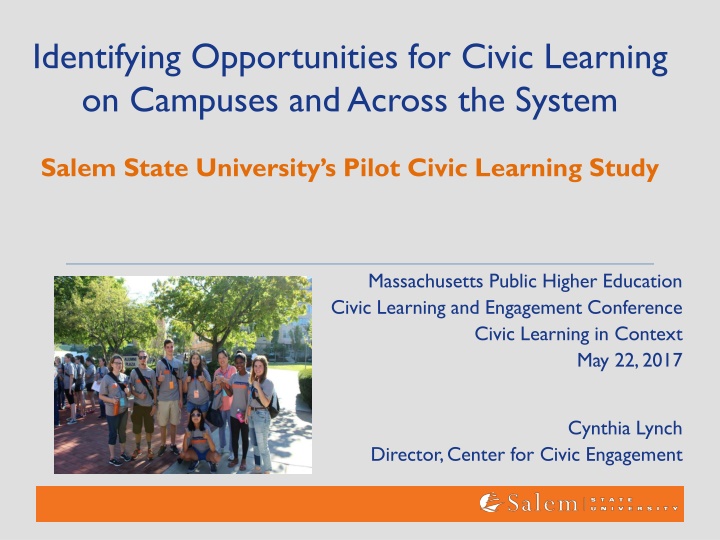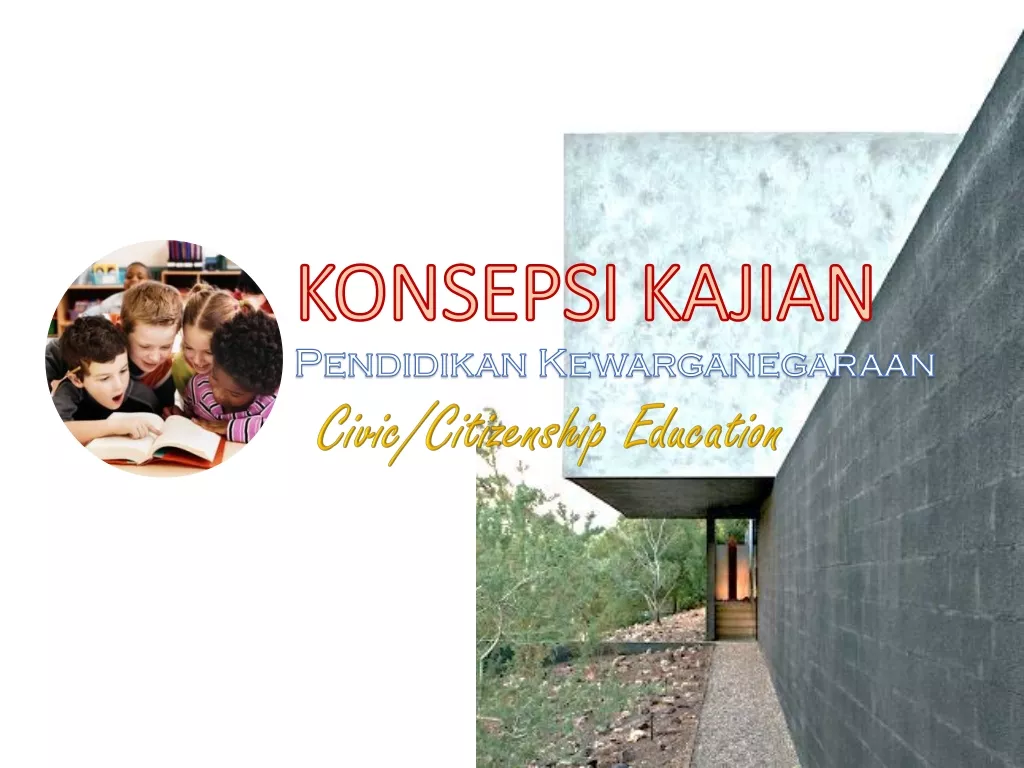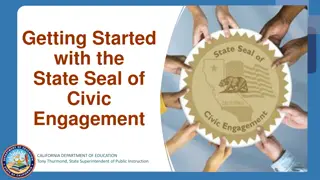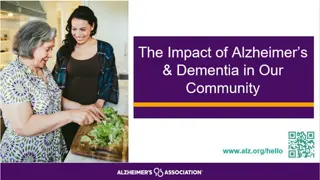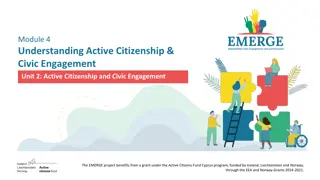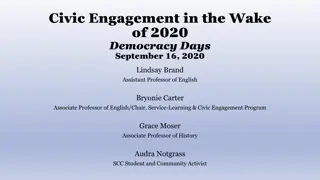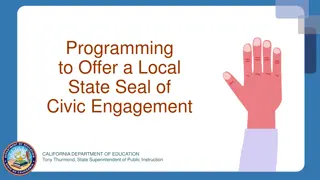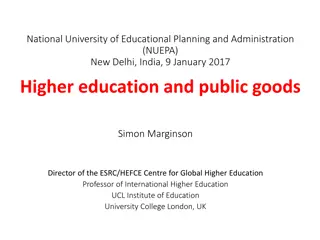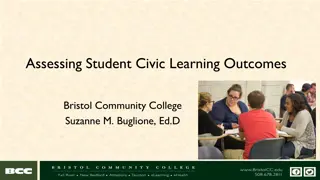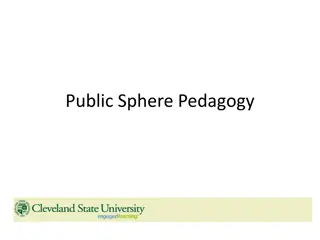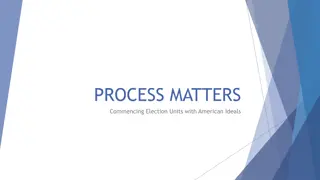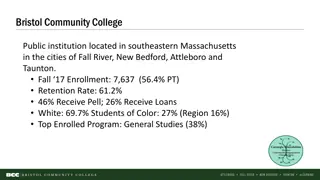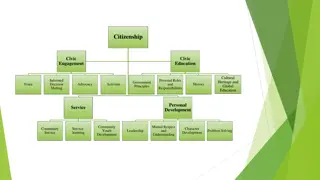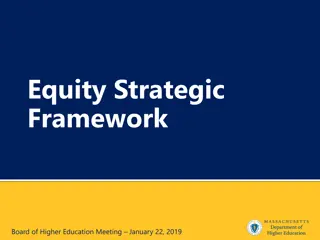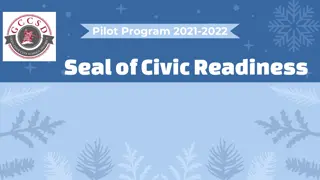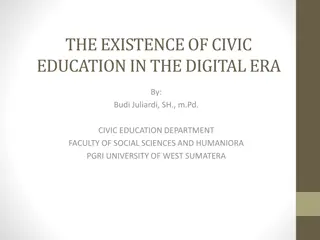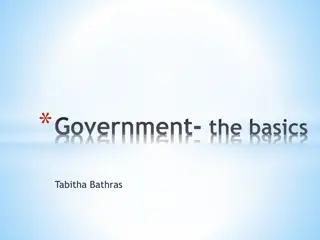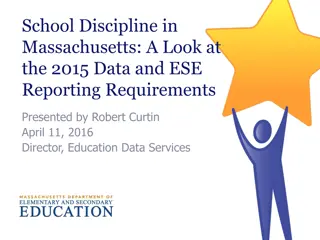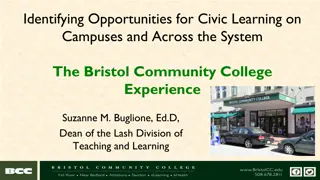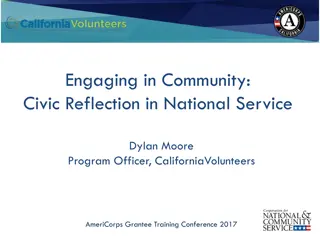Opportunities for Civic Learning in Massachusetts Public Higher Education
Salem State University conducted a pilot Civic Learning Study to identify opportunities for civic learning on campuses and across the system. The study aimed to develop sustainable tools for reporting data, collect prevalence data, and enhance civic learning through professional development. The timeline shows progress in data collection, analysis, and revisions of tools and processes. Future plans include assessing learning outcomes, measuring depth of engagement, and expanding reporting mechanisms.
Download Presentation

Please find below an Image/Link to download the presentation.
The content on the website is provided AS IS for your information and personal use only. It may not be sold, licensed, or shared on other websites without obtaining consent from the author.If you encounter any issues during the download, it is possible that the publisher has removed the file from their server.
You are allowed to download the files provided on this website for personal or commercial use, subject to the condition that they are used lawfully. All files are the property of their respective owners.
The content on the website is provided AS IS for your information and personal use only. It may not be sold, licensed, or shared on other websites without obtaining consent from the author.
E N D
Presentation Transcript
Identifying Opportunities for Civic Learning on Campuses and Across the System Salem State University s Pilot Civic Learning Study Massachusetts Public Higher Education Civic Learning and Engagement Conference Civic Learning in Context May 22, 2017 Cynthia Lynch Director, Center for Civic Engagement
Pilot Civic Learning Study Goals: 1. Develop a sustainable tool and process to be able to report data to the DHE via the HEIRS database. 2. Collect data on the prevalence of civic learning at Salem State for internal and external purposes. 3. Work with departments to develop civic learning and engagement professional development plans.
Timeline and Process Winter 2016 Spring 2016 Spring 2016 PILOT 1 1. Three Departments: Sports and Movement Science, Political Science, Communications 2. 141 Course Section Syllabi 3. Six- person audit team training for inter-rater reliability. 1. Data analyzed and reports developed 2. Department meetings 3. Revision of data collection tool 4. Revision of survey process and training 1.Quality v. Quantity -new to SSU 2.Develop Data Collection Tool 3.Design Survey Monkey 4.Determine what is and is not CL and CLE Spring 2017 Fall 2016 PILOT 2 1. Three Pilot 1 departments plus Criminal Justice and Geography 2. 247 Course Section Syllabi 3. Eight- person audit team 1. Continued revisions of tool and committee approval 2. Expanded pilot 3. Expanded inter-rater reliability training sessions
Timeline and Process Spring 2017 Spring 2017 1. Data analyzed and reports developed. 2. Data much more accurate 3. Data collection process more auditor friendly 4. Still some lingering issues 1. Department meetings 2. Discrepancies discussed and analyzed 3. Professional development opportunities discussed and planned Future Future 1. Learning Outcome Assessment of Civic Learning and Civic Learning with Engagement 2. Develop tools to measure the depth of CL and CLE that occurs because of its prevalence 1. Scale up 2. Firm up reporting mechanisms 3. Develop professional development opportunities across disciplines and across campus
Overview of Data: Spring 2017 Total Syllabi Audited DEPT 123 SMS 40 COM 37 CJ 26 GPH 20 POL 246 Syllabi TOTAL OVERALL
Civic Learning Question One 120% 100% 80% 60% 40% 20% 0% 1.1 Familiar with texts, institutions, principles and/or methods that contribute to the public good 1.2 Examine how diverse forces shape society 1.3 Examine social issues or civic dimensions of the discipline 1.4 Aware of social or political systems and Levers of Power for influencing change 1.5 Identify social movements and its connection to social change SMS COM CJ GPH POL
Civic Learning Question Two 120% 100% 80% 60% 40% 20% 0% 2.1 Engage with and be informed by multiple perspectives 2.2 Use scientific reasoning and/or critical inquiry to understand social issues 2.3 Use scientific reasoning and/or critical inquiry to make decisions 2.4 Read, write, speak, listen, and use communication media effectively 2.5 Reflect on experience to gain insight and guide action SMS COM CJ GPH POL
Civic Learning Questions Three-Five 120% 100% 80% 60% 40% 20% 0% 3.1 Challenge injustice and address its root causes 3.2 Work collectively in groups to address common problems 3.3 Develop strategies to improve the quality of people's lives and/or the sustainability of the planet 3.4 Analyze and navigate systems [e.g., political, social, economic] to learn how to engage in public action 4.1 Commitment to justice and equality; capacity for compromise, civility, and mutual respect; and/or responsibility to a larger good No. Does not meet any of the above four CL requirements [1.1- 4.6] Yes. Meets at least one of the above four CL requirements [1.1-4.6] Civic Engagement activity/ action included within course SMS COM CJ GPH POL
Spring 2017 Trends 42% 53% Of the131 civic learning syllabi, 55 were found to include a Civic Engagement Activity (CLE). Out of the 246 total syllabi audited,131 were found to include Civic Learning (CL).
Spring 2017 Trends Least Frequently Answered Questions: 10% (25 syllabi) answered 3.1 Challenge injustice and address its root causes 10% (24 syllabi) answered 3.2 Work Collectively in groups to address common problems 9% (22 syllabi) answered 1.5 Identify social movements and its connection to social change Most Frequently Answered Questions: 43% (105 syllabi) answered 2.1 Engage with and be informed by multiple perspectives 43% (105 syllabi) answered 2.4Read, write, speak, listen, use communication media effectively 39% (96 syllabi) answered 1.3 Examine social issues or civic dimensions of the discipline
Spring 2017 Civic Learning/Civic Learning & Engagement (Criminal Justice Department) 120% 100% 80% 60% 40% 20% 0% CJ commitment to justice and equality; commitment Yes. Meets at least one of the above four CL 1.3 Examine social issues or civic dimensions of the 1.4 Aware of social or political systems and Levers No. Does not meet any of the above four CL 1.5 Identify social movements and its connection to 2.4 Read, write, speak, listen, and use 3.2 Work collectively in groups to address 1.2 Examine how diverse forces shape society 2.1 Engage with and be informed by multiple 2.2 Use scientific reasoning and/or critical inquiry 2.3 Use scientific reasoning and/or critical inquiry 3.1 Challenge injustice and address its root causes Civic Engagement activity/ action included within social, economic] to learn how to engage in public 2.5 Reflect on experience to gain insight and guide and/or methods that contribute to the public good people's lives and/or the sustainability of the planet 3.3 Develop strategies to improve the quality of 3.4 Analyze and navigate systems [e.g., political, communication media effectively 4.1 Capacity for empathy, open-mindedness, 1.1 Familiar with texts, institutions, principles tolerance, and appreciation for diversity; of Power for influencing change to understand social issues common problems indicators [1.1-4.6] indicators [1.1-4.6] to make decisions perspectives course (CLE) social change discipline action action
Criminal Justice Department Trends 54% 100% Of the 37 CJ civic learning syllabi, 20 were found include a Civic Engagement Activity(CLE). Out of the 37 total CJ syllabi audited, 37 (ALL) were found to include Civic Learning (CL).
Strengths Department Meetings Deeper involvement in the CL/CLE work Buy in! Continuous improvement of data collection tool and process New professional development ideas generated Growing understanding of the breadth of CL/CLE at Salem State CL/CLE data used in annual reports Civic Learning is occurring in over 50% of the course sections (probably more when limitations are taken into account) Tool dramatically improved Roughly two minutes/syllabus Reliability definitely improved! Initial HEIRS database reporting protocols developed and piloted
Limitations Useof only the syllabi and not the assignments for the audit process Some syllabinot turned in on time Not having a disciplinary expert who knows the terminology and is familiar with the program and faculty who teach the sections Turnover in audit team and the need for additional training Turnover in graduate students who perform the data analysis and develop the department reports Challenges in scaling up personnel and budget
Next Steps Continue to refine process and revise tool currently only doing it with spring courses need to develop a fall process Discuss process for scaling up Additional graduate students Department liaisons On agenda for summer department head meetings Work with the registrar and strategic planning and decision support on HEIRS reporting processes Develop professionalDevelopment opportunitiesto meet identified departmental needs as well as a focus on CLE Create learning outcome assessment tools for CL and CLE
